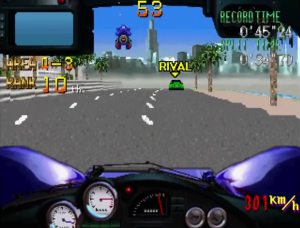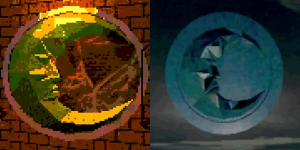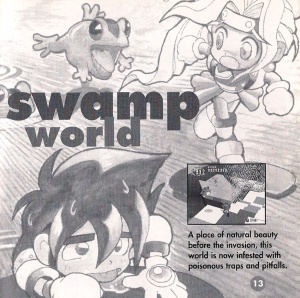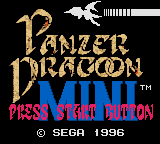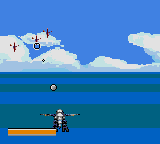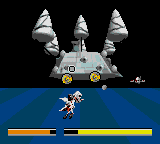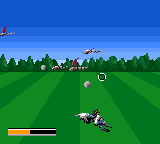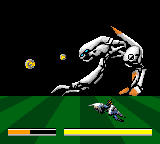Difference between revisions of "Main Page"
m (→Webmaster's Blog) |
|||
| Line 12: | Line 12: | ||
|valign="top"| | |valign="top"| | ||
<startFeed /> | <startFeed /> | ||
| − | |||
==[[Blog:Sounders: Natsume (Where Are They Now)|Sounders: Natsume (Where Are They Now)]]== | ==[[Blog:Sounders: Natsume (Where Are They Now)|Sounders: Natsume (Where Are They Now)]]== | ||
Revision as of 03:38, 14 September 2016
|
GDRI is dedicated to researching the companies and people involved with video game development. Find out more... | |||||||||
|
<startFeed /> Sounders: Natsume (Where Are They Now)CRV (talk) 05:07, 11 August 2016 (CEST) [permalink] In the first edition of a new feature chronicling sound designers and production companies, GDRI catches up with some of the sound designers from Natsume (now Natsume Atari)'s 8/16-bit golden age.
Gale Racer (Saturn)CRV (talk) 05:33, 3 August 2016 (CEST) [permalink] The first game released for Sega's System 32 arcade hardware, Rad Mobile was impressive when it came out back in 1991. Three years would pass before there was a home system powerful enough to contain it. Enter Gale Racer for the Saturn. The object, like the arcade game, is to drive from Los Angeles to New York and claw your way to first place. But does this Saturn version perfectly replicate the arcade experience? Not quite. While Rad Mobile moves seamlessly from locale to locale ala Out Run, Gale Racer pauses between stages to show you your time and load the next section. This really changes — some might even say ruins — the flow of the game. Other vehicles on the road are made of polygons instead of sprites, which looks a little janky. The draw distance is lower, and the frame rate is not as smooth. The whole game seems a little buggy and a little glitchy. Development of Gale Racer was handed off to System Sacom, which was known mostly for adventure games. Main programmer Hiroshi Ogino wrote an e-book about his time at the company, and he devoted an entire chapter to this game. Not surprisingly, porting it was quite difficult; the arcade cabinet and image/stage data were made available, but not the source code. Sega of America was at one time planning a US version, as it was mentioned in a press release announcing the Saturn's early launch. GameFan reported that it would "be completely repaired to mimic the arcade game perfectly." When asked about it, Ogino seemed to have no recollection. [1]
Post updated September 4, 2020 Change of Heart: Secular Developers Turned ChristianCRV (talk) 05:36, 30 January 2016 (CET) [permalink] A joke, circumstance, opportunity, a calling. Whatever the reason, some secular developers switched to, or at least tried their hand at, making Bible-based video games. Wisdom TreeThe most well-known example grew out of Color Dreams, a publisher and developer of unlicensed games for the Nintendo Entertainment System. Color Dreams founder Dan Lawton allegedly came up with the idea of doing religious games as a joke. Early on, Wisdom Tree took the older, more violent Color Dreams games and inserted family-friendly, Bible-related content. Sunday Funday: The Ride (NES) is basically a hack of Menace Beach, while Exodus: Journey to the Promised Land and Joshua & the Battle of Jericho (NES, et al.) were based on Crystal Mines. Since then, Wisdom Tree has put out a number of original educational and entertainment titles and continues to sell them on its website. Color Dreams is still around, doing business as StarDot Technologies, making surveillance cameras and related equipment. See also: {{#ev:youtube|9vzSAFayegI}} {{#ev:youtube|0SjOvOUXn9A}}
Credit to the creators/uploaders of the videos above Japanese-Developed Digitized Fighting GamesCRV (talk) 00:58, 24 December 2015 (CET) [permalink] The success of Midway's arcade blockbuster Mortal Kombat birthed many imitators. Would you believe some of them came from Japan? Reikai Doushi (1988, Arcade)While Mortal Kombat was the breakthrough hit that influenced a lot of games, it was not the originator of the digitized fighting form. Neither was Pit-Fighter. No, that honor goes to this little number by Home Data (now Magical) featuring a colorful cast of grotesque Chinese puppets. {{#ev:youtube|ifBJbECq3yE}}
Floating Runner (PlayStation)CRV (talk) 23:11, 5 September 2015 (CET) [permalink] Hey, it's a 3D platformer that came out before Super Mario 64 and before analog control was standard on consoles. That's pretty cool, right? Right? In Floating Runner, you lead either adorable bounty hunter Lay or adorable priestess Cress on a journey to find seven crystals to save Crystal Land. Adorable enemies will try to stop you, but you can stop them with your adorable weapons. As adorable as everything is, there are problems, and you can't blame them all on age. Some make the game unnecessarily frustrating to play at times and could have been avoided. Let's run down the list:
Better weapons and less ponderous stage layouts would have gone a long way in making a better game, but it's not all bad. The frame rate is brisk. The music is pleasant (though sometimes repetitive), as is the mix of flat-shaded and texture-mapped polygons. It's still a charming game. For many years, it was a mystery who developed this pioneer software. There are no ending credits. Xing is the only Japanese company name that appears in-game or on the game, but they were just a publisher. Modern technology allows us to look inside the data and find an unused T&E Soft copyright notice and list of credits. It's not clear if they were supposed to be displayed on-screen. It's bizarre that a company like T&E Soft would make a game like this and leave their name off. Hydlide creator Tokihiro Naito talked very briefly about Floating Runner during his interview in The Untold History of Japanese Game Developers Volume 2. He didn't know anything about it, unfortunately; he was about to leave T&E Soft and had little interest in their in-house games. He said it may have been developed by the Osaka branch. A check of the names suggests that is the case. (T&E Soft's Osaka branch [formerly Xtalsoft] is where games like Red Alarm were also made.) D4 Enterprise, the company behind the Project EGG service, acquired the rights to T&E Soft's back catalog in 2019. Floating Runner can be found in their list of properties.
Post updated January 31, 2020 Panzer Dragoon Mini (Game Gear)CRV (talk) 16:35, 24 June 2015 (CEST) [permalink] Towards the end of the Game Gear's life in Japan, Sega rebranded it the Kid's Gear in an attempt to market the system to children. One of the handful of titles released under this brand was Panzer Dragoon Mini, but there's nothing particularly cute about it. This is just Panzer Dragoon, stripped to the bare bones. After you choose one of three dragons to control (not ride, apparently), it's on to the action. You make your way through several stages, shooting down enemies with either your regular shot or a lock-on laser. (There's no berserk attack despite the game coming out after Zwei.) Sometimes the camera shifts to the side, but that's about as exciting as it gets. (Even the R-Zone version had camera control.) There are mid-bosses and end bosses, but their attack patterns consist primarily of moving back and forth spraying bullets. The backgrounds and especially the sprites look nice. The music is pleasant as well; whoever did these arrangements should be commended. (Hitoshi Sakimoto's works list says he only programmed the sound driver.) It's just a shame the game isn't better. That's a tough thing to say, because it was clearly made by capable people. (My guess is the development period was very short.) All the evidence here points to Rit's as the developer; Rit's also made some original RPGs, most notably the Dragon Master Silk series, and worked on many of the old Shining games. In addition, the president of the company — the artist known professionally as Hiroshi Kajiyama (who passed away in 2018) — acknowledged working on the game on Twitter. Some images from SMS Power! Post updated March 11, 2020 Pinball Spirits (Windows)CRV (talk) 04:48, 14 May 2015 (CEST) [permalink] I like me some video pinball; I've amassed a decent collection of video pinball games. So when I found out about a pinball game that involved GDRI veteran Opera House and only came out in Japan, I was interested. Actually, even if it isn't great, I want it. But good luck finding it - not only is Pinball Spirits a Japanese exclusive, it's available only for Windows. There's a copy on Amazon Japan for under $60 US. Enjoy the cover shots at the link because that's all you're gonna see. Such is the world of Japanese Windows games. They seem to be among the most poorly documented and poorly preserved, unless there's something going on that I don't know about (which is possible). At least shopping sites like Amazon have games listed. There's more than just eroge. Did you know Konami released games like Henry Explorers (Crypt Killer) for Windows in Japan? Fun fact about Pinball Spirits: It was produced in cooperation with the non-profit Tokyo Pinball Organization. Read more about them here. <endFeed /> | |||||||||
|
BLOG ARCHIVE (Newest-to-oldest) 13 | 12 | 11 | 10 | 9 | 8 | 7 | 6 | 5 | 4 | 3 | 2 | 1 |




